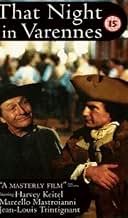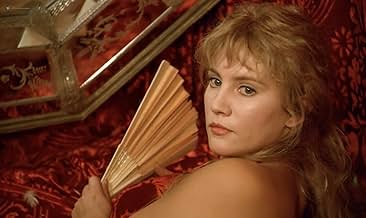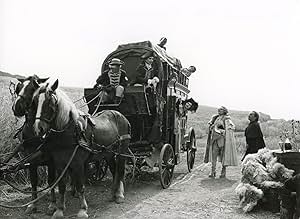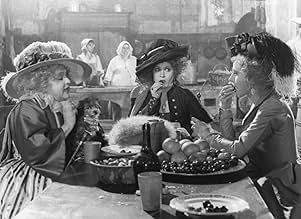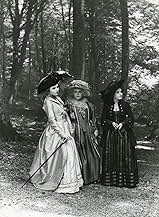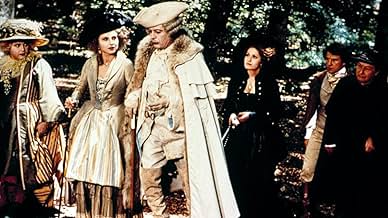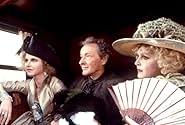VALUTAZIONE IMDb
7,2/10
2652
LA TUA VALUTAZIONE
Nel giugno del 1791, un gruppo di passeggeri su una diligenza si ritrova coinvolto negli eventi della Rivoluzione francese, quando si trovano nella città di Varennes nel momento in cui i riv... Leggi tuttoNel giugno del 1791, un gruppo di passeggeri su una diligenza si ritrova coinvolto negli eventi della Rivoluzione francese, quando si trovano nella città di Varennes nel momento in cui i rivoluzionari arrestano il re Luigi in fuga.Nel giugno del 1791, un gruppo di passeggeri su una diligenza si ritrova coinvolto negli eventi della Rivoluzione francese, quando si trovano nella città di Varennes nel momento in cui i rivoluzionari arrestano il re Luigi in fuga.
- Regia
- Sceneggiatura
- Star
- Premi
- 6 vittorie e 16 candidature totali
Recensioni in evidenza
One of the most notable reviewers on this site condemned "La nuit de Varennes" to 2,5 stars (out of 4), but I am of the opinion that this movie should be appreciated better : there are not so many cinematic works in our times that are carried by such valuable concept,i.e. that preach and teach dignity and tolerance opposed to a laudable but often misguiding need to serve some higher principle. "Idiocy is the worst of treasons. - And no revolution will ever stop it." In Scola's historical comedy of manners, thoughts and emotions, Barrault's Restif is the key figure which spans a bridge between humble vox populi of Thomas Paine and aristocratic grandeur of Casanova. Watching this movie I felt like the spirit of wiser old Europe (which is still there, thanks to Scola a.o.) entered the body of Robert Altman's shape. French blu-ray with English subtitles is to be treasured.
10rab-int
We really enjoyed this. Barrault and Mastroianni are terrific actors--did an outstanding job. The philosophical questions raised are still worth considering today, as the movie implies, and yet they are raised in an interesting and indirect way, so the viewer doesn't feel bludgeoned or lectured at.
I was interested to discover that the flight to Varennes was in fact historical, though I could not discover whether Restif de Bretonnes (Barrault's character) was actually at the event and commented on first-hand knowledge. He did write extensively about life and events of the time. The interchange of ideas seemed natural, despite the apparent absurdity of finding all of them in the same coach at the same time. Sort of like those "if you could invite 5 historical figures to dinner at the same time" ideas.
Very much worth seeing.
I was interested to discover that the flight to Varennes was in fact historical, though I could not discover whether Restif de Bretonnes (Barrault's character) was actually at the event and commented on first-hand knowledge. He did write extensively about life and events of the time. The interchange of ideas seemed natural, despite the apparent absurdity of finding all of them in the same coach at the same time. Sort of like those "if you could invite 5 historical figures to dinner at the same time" ideas.
Very much worth seeing.
great performances. a slice of history. gems-scenes. the bitter atmosphere of a fall of an world. a film for memories. with slices of beautiful dialogue and a splendid Mastroianni, the testimonies and voices and words of a night. the tension and the royal couple. and the smoke of a room, drinks and small portraits. short, a film who preserves, in your memory, for long time, its delicate flavor. and it is enough.
Besides boasting wonderful performances by two of my favourite actors (Marcello Mastroianni and Harvey Keitel), Il Mondo Nuovo (as it's known in Italy) by acclaimed Italian director Ettore Scola is to me as satisfying as a good classic novel, one of those 800-page tomes you approach with a little trepidation and then remember for years to come, wishing other novels you read would compare.
It's the year 1791 and on board a stagecoach, an assortment of characters from different parts of the world are traveling from Paris to Verdun. Along the way the coach picks up the aging (his character is 67 years old in the film), legendary Venetian seducer Giacomo Casanova, as well as the controversial, fawn-like but ahead-of-his-time chronicler and novelist, Restif de la Bretonne. The stagecoach's original travelers include the American Revolution survivor Thomas Paine (Keitel), as well as a melancholic and reserved widow aching to fall in love again, a beautiful and intelligent yet devoutly Monarchist Austrian Countess, a sharp and cheeky Italian opera singer eternally clutching a pet poodle and poking fun at her dim and bigoted husband, as well as a cocky young Jacobean. The coach also includes their servants, among whom the young Countess's devoted butler and her pretty African maid, who soon hooks up with the young Jacobean. Not far ahead of them, another stagecoach carrying the fleeing French royal family - Louis XVI, Marie Antoinette and their children is also traveling along the same road, unaware this will be the route to their irrevocable death sentence.
The story is told through the dialogues and anecdotes of a group unaware of their status as main witnesses to what will turn out to be one of history's most pivotal moments. Besides the breathtakingly authentic feel of the time - you really feel like you've stepped into a Hogarth painting - what's most remarkable is how you also get the sense such historic events are happening in real time, so convincing are the reactions of bewilderment and astonishment on the character's part. A series of vignettes, made delicious by the top-class characterisation and dialogue, contribute to moving the plot along as well as giving the viewer some light relief which however never loses sight of the breathless atmosphere of those revolutionary times.
Mastroianni as the self-deprecating, tired, aging Casanova is a treat from the very first frame he graces to the last. This legendary actor has always brought a unique depth of humanity to his roles, but despite all the other fine actors and characters in this film I just couldn't have imagined it without him. I adored the moment, after having charmed all the ladies and even some of the men on the stagecoach, Casanova kisses the young Austrian Countess's besotted gay butler on the lips and as a parting shot says: "I don't exclude anything on principle."
Especially memorable are the final frames of the film, in which the young Austrian Countess and her butler, after having dressed a wooden dummy in a spartan inn room with the doomed king's ceremonial costume, bow down to it with devotion, symbolising the ephemeral and temporal nature of an earthly kingdom. Some will consider this Italo-French production overlong, others won't be fond of its un-Hollywoodlike approach to the historic genre, others will even consider some of its characters unappealing. On my part I consider these the film's strengths and cannot help but warmly recommending it. My only real complaint is: why hasn't it yet been released on DVD?
It's the year 1791 and on board a stagecoach, an assortment of characters from different parts of the world are traveling from Paris to Verdun. Along the way the coach picks up the aging (his character is 67 years old in the film), legendary Venetian seducer Giacomo Casanova, as well as the controversial, fawn-like but ahead-of-his-time chronicler and novelist, Restif de la Bretonne. The stagecoach's original travelers include the American Revolution survivor Thomas Paine (Keitel), as well as a melancholic and reserved widow aching to fall in love again, a beautiful and intelligent yet devoutly Monarchist Austrian Countess, a sharp and cheeky Italian opera singer eternally clutching a pet poodle and poking fun at her dim and bigoted husband, as well as a cocky young Jacobean. The coach also includes their servants, among whom the young Countess's devoted butler and her pretty African maid, who soon hooks up with the young Jacobean. Not far ahead of them, another stagecoach carrying the fleeing French royal family - Louis XVI, Marie Antoinette and their children is also traveling along the same road, unaware this will be the route to their irrevocable death sentence.
The story is told through the dialogues and anecdotes of a group unaware of their status as main witnesses to what will turn out to be one of history's most pivotal moments. Besides the breathtakingly authentic feel of the time - you really feel like you've stepped into a Hogarth painting - what's most remarkable is how you also get the sense such historic events are happening in real time, so convincing are the reactions of bewilderment and astonishment on the character's part. A series of vignettes, made delicious by the top-class characterisation and dialogue, contribute to moving the plot along as well as giving the viewer some light relief which however never loses sight of the breathless atmosphere of those revolutionary times.
Mastroianni as the self-deprecating, tired, aging Casanova is a treat from the very first frame he graces to the last. This legendary actor has always brought a unique depth of humanity to his roles, but despite all the other fine actors and characters in this film I just couldn't have imagined it without him. I adored the moment, after having charmed all the ladies and even some of the men on the stagecoach, Casanova kisses the young Austrian Countess's besotted gay butler on the lips and as a parting shot says: "I don't exclude anything on principle."
Especially memorable are the final frames of the film, in which the young Austrian Countess and her butler, after having dressed a wooden dummy in a spartan inn room with the doomed king's ceremonial costume, bow down to it with devotion, symbolising the ephemeral and temporal nature of an earthly kingdom. Some will consider this Italo-French production overlong, others won't be fond of its un-Hollywoodlike approach to the historic genre, others will even consider some of its characters unappealing. On my part I consider these the film's strengths and cannot help but warmly recommending it. My only real complaint is: why hasn't it yet been released on DVD?
A fantastic film with magnificent cerebral talks and actors, costumes, and backgrounds that allow you to journey across time. It's like seeing through a window into the madness of the French Revolution, when people pondered the past, present, and future. If you're seeking for a historically accurate film, this is a must-see.
Lo sapevi?
- QuizHarvey Keitel's voice was dubbed in the movie.
- Versioni alternativeOriginal French-language version runs 150 minutes. The version released theatrically in the USA removes 17 minutes of footage.
- ConnessioniFeatured in Marcello Mastroianni: mi ricordo, sì, io mi ricordo (1997)
I più visti
Accedi per valutare e creare un elenco di titoli salvati per ottenere consigli personalizzati
- How long is That Night in Varennes?Powered by Alexa
Dettagli
- Data di uscita
- Paesi di origine
- Lingue
- Celebre anche come
- That Night in Varennes
- Luoghi delle riprese
- Pont Saint-Michel, Paris 1, Parigi, Francia(bridge in Paris)
- Aziende produttrici
- Vedi altri crediti dell’azienda su IMDbPro
- Tempo di esecuzione2 ore 30 minuti
- Mix di suoni
- Proporzioni
- 1.66 : 1
Contribuisci a questa pagina
Suggerisci una modifica o aggiungi i contenuti mancanti

Divario superiore
By what name was Il mondo nuovo (1982) officially released in Canada in English?
Rispondi

